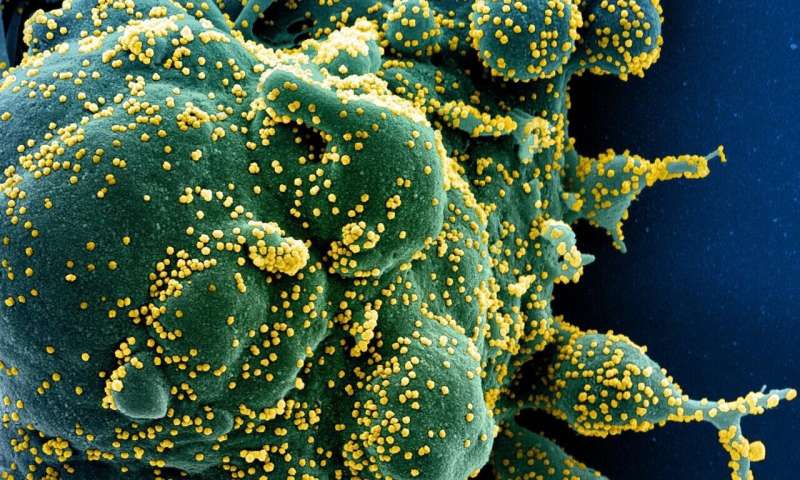Study demonstrates the effectiveness of raloxifene in treating inflammatory processes associated with COVID-19

Researchers from the UPC's Molecular Biotechnology Centre show that a drug for osteoporosis called raloxifene may inhibit molecules involved in the inflammatory processes associated with COVID-19.
About 20% of COVID-19 patients have a severe clinical picture and require intensive care. These patients develop varying degrees of pneumonia that may evolve to more severe stages and cause organ dysfunction. Patients with severe symptoms exhibit elevated levels of proinflammatory molecules, a reaction known as cytokine storm. Recently, scientists have found that an inflammatory mediator known as bradykinin may trigger this inflammatory process that is observed in patients with severe COVID-19and that can be deadly.
In the fight against the disease, researchers are turning to drug repurposing to quickly provide a therapy by using already existing drugs. In this context, the researchers Juan Jesús Pérez and Patricia Gómez-Gutiérrez, from the Molecular Biotechnology Centre and linked to the Department of Chemical Engineering of the Universitat Politècnica de Catalunya · BarcelonaTech (UPC), have been looking for drugs to prevent bradykinin signaling. Using virtual drug screening, they have discovered that raloxifene, a drug used for osteoporosis and certain types of breast cancer, can act as a bradykinin inhibitor.
The study was conducted using computer-aided molecular design. The principal investigator, Juan Jesús Pérez, a professor at the Barcelona School of Industrial Engineering (ETSEIB), says, "We have performed drug screening using computer-aided drug design methods. After identifying the compound in silico, we sent a sample to an external laboratory for its in vitro characterisation, which corroborated its new pharmacological profile, and raloxifene has been shown to act as a partial agonist of bradykinin."
The conclusions of this research are set out in the article Discovery of a bradykinin B2 partial agonist profile of raloxifene in a drug repurposing campaign, which was published in the scientific journal International Journal of Molecular Sciences.
Inhibiting bradykinin could be key to treating COVID-19
The increased availability of bradykinin in severe COVID-19 patients could be the trigger for cytokine storm. This hypothesis relies on the downregulation of angiotensin converting enzyme 2 (ACE2), the gateway for SARS-Cov-2 into cells, in such patients. This new perspective suggests that inhibition of bradykinin signaling may be a suitable therapy to prevent cytokine storm and its consequences.
Currently, icatibant is the only bradykinin antagonist approved as a therapeutic agent for the treatment of hereditary angioedema and it is now undergoing a clinical trial to assess its benefits for the treatment of COVID-19 patients. In fact, preliminary results from a limited study suggest that inhibition of bradykinin signaling is associated with decreased oxygen requirements in COVID-19 patients.
Raloxifene undergoing clinical trial as an antiviral agent
The result of the study by UPC researchers supports other studies suggesting the suitability of raloxifene in COVID-19 patients, based on its capacity to inhibit another inflammation signaling pathway, and also for being a prospective antiviral agent against severe acute respiratory syndrome coronavirus 2 (SARS-CoV-2).
In the framework of a European project, the Exscalate4CoV consortium of supercomputing centers, including the Barcelona Supercomputing Center–Centro Nacional de Supercomputación (BSC-CNS), identified raloxifene, aimed at another therapeutic target, as an antiviral agent against SARS-CoV-2 in June 2020, also by using virtual screening techniques. Clinical trials are now underway in Italy to test its effectiveness in patients with mild symptoms.
Juan Jesús Pérez says, "The good results of the lines of research on raloxifene suggest that it is a good candidate drug against COVID-19."The researcher explains that "drug repurposing has long been used to discover new therapeutic uses for existing drugs, because it increases the chances that the compound can be used. In addition, clinical trials will not take as long as for a new drug, because its toxicity has already been tested."
More information: Patricia Gomez-Gutierrez et al. Discovery of a Bradykinin B2 Partial Agonist Profile of Raloxifene in a Drug Repurposing Campaign, International Journal of Molecular Sciences (2020). DOI: 10.3390/ijms22010257





















